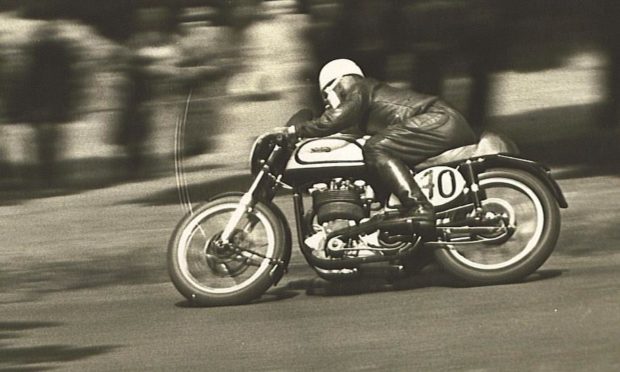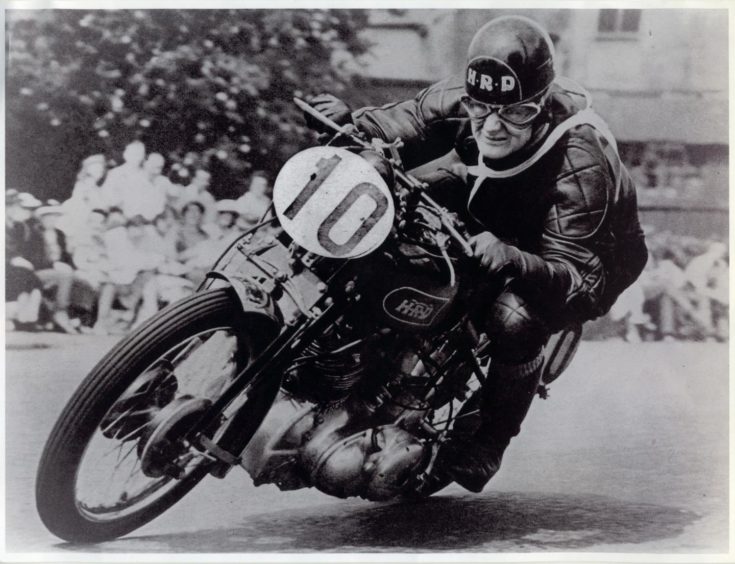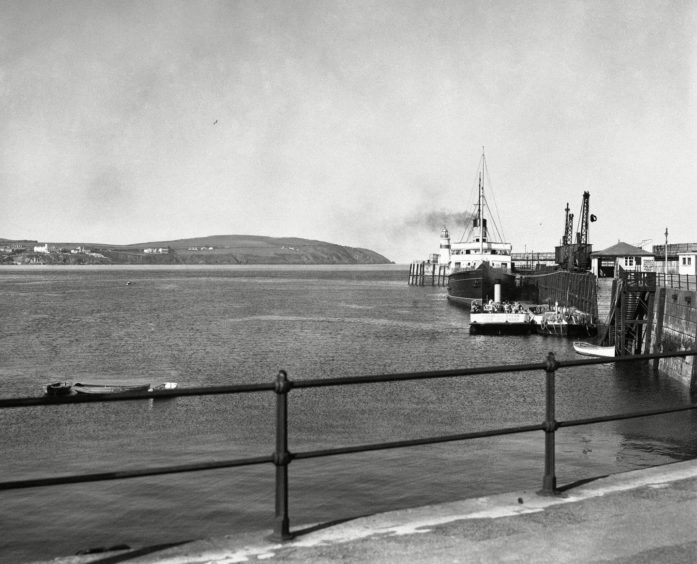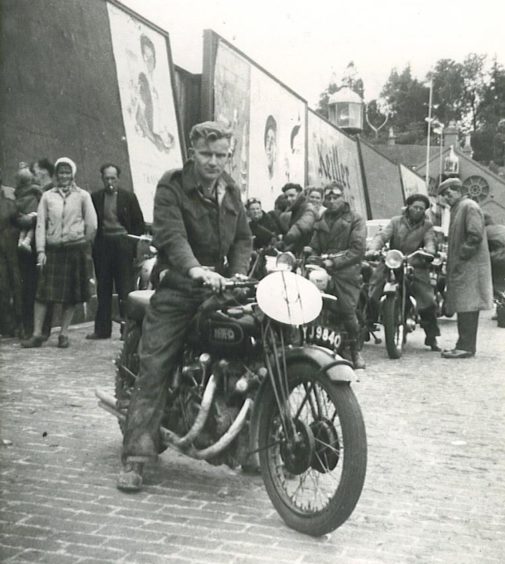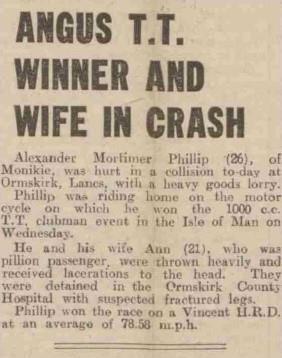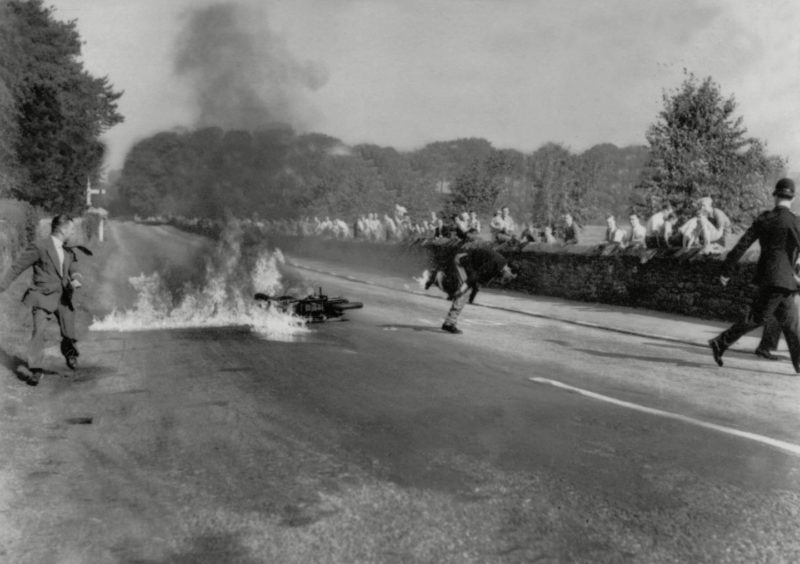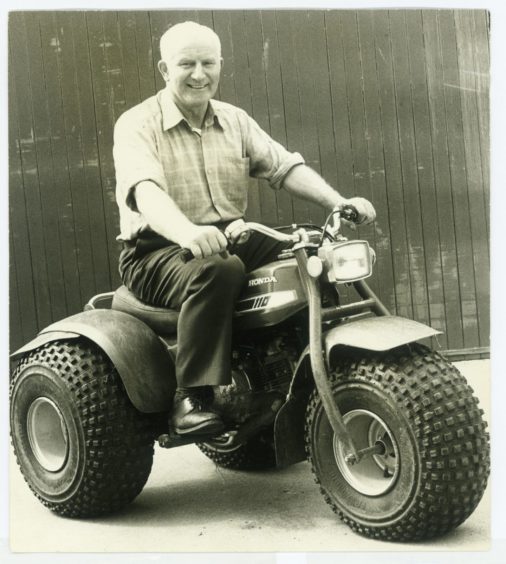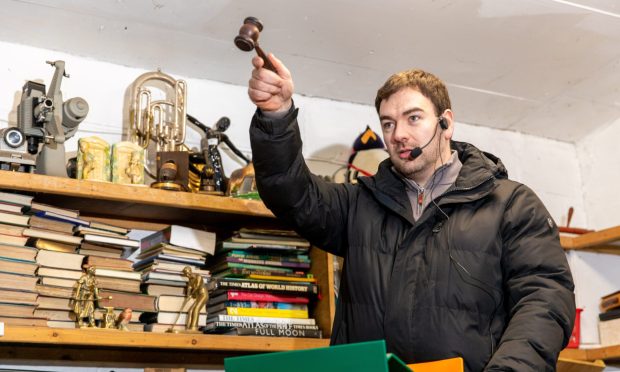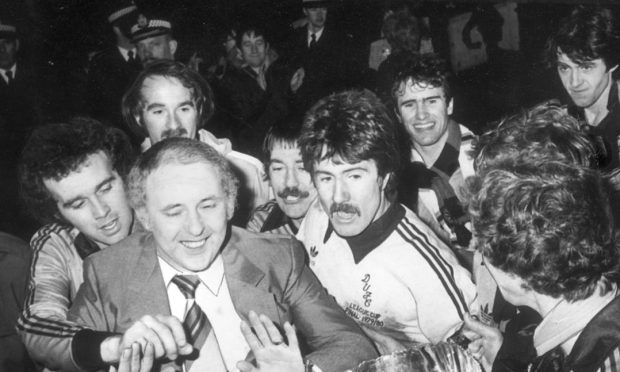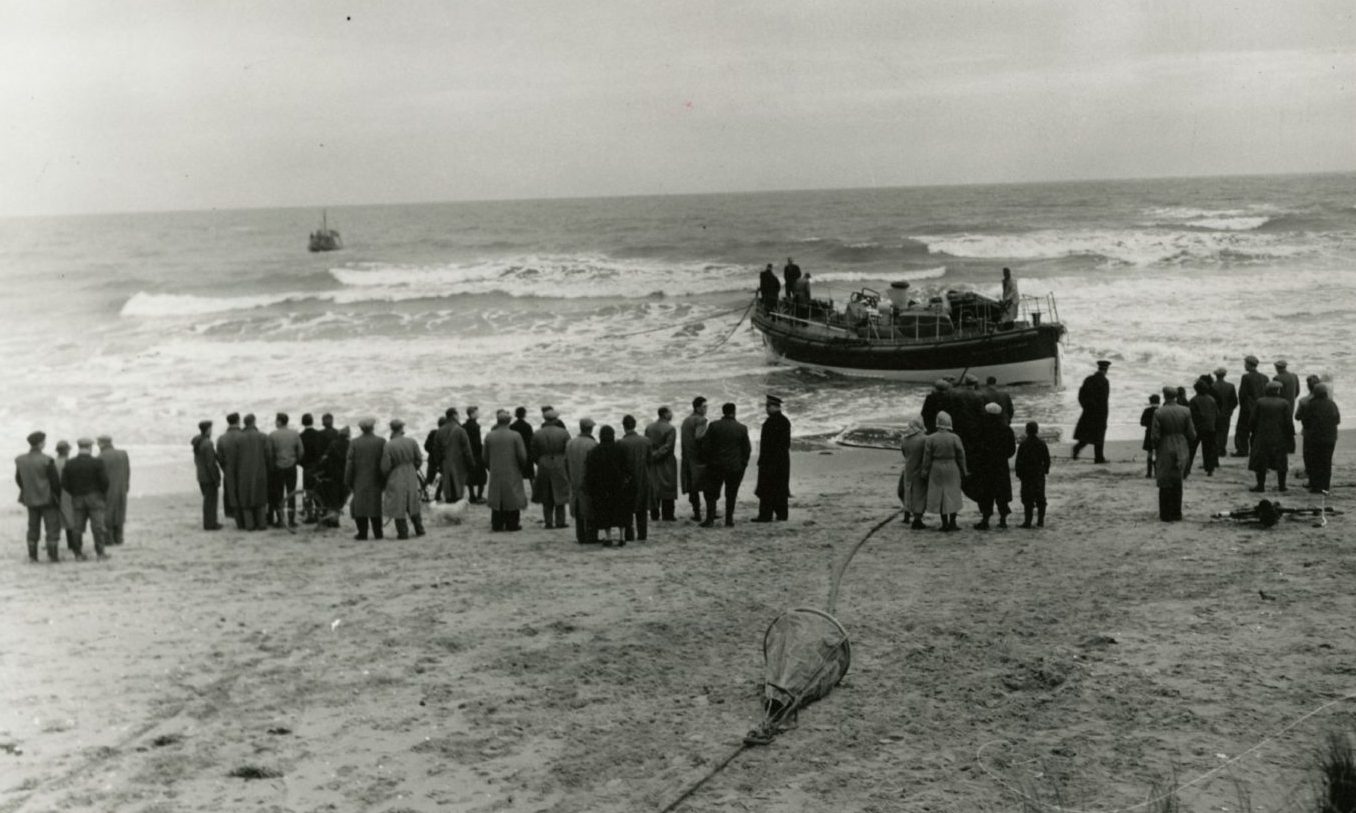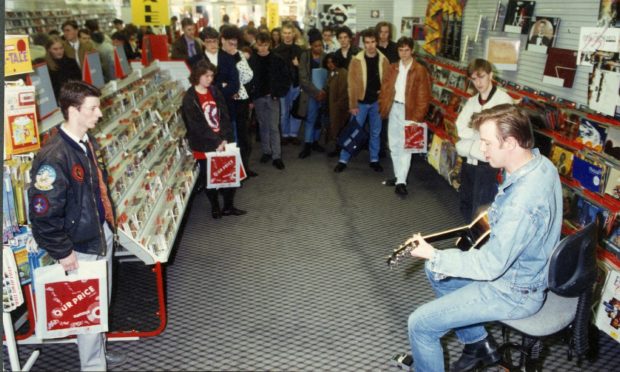Angus racing hero Eck Phillip was on top of the world when he rode to victory in the Isle of Man TT races in 1950 and set a new record.
On the way home, with his new wife Annie on the pillion, joy turned to tragedy as they were broadsided by a milk truck at Ormskirk in West Lancashire.
Both Eck and Annie were crushed by the bike, suffering life changing injuries, and each walked with the same limp in their left leg from then on.
Seventy years ago in 1951 Eck was released from the Bridge of Earn Hospital nine months after the accident, almost penniless.
Story worthy of a Hollywood script
They moved to an old house with no electricity, no water and no toilet but fought back from the brink in a rags-to-riches tale which was worthy of its own Hollywood script.
Eck continued his racing career, becoming a Scottish speed champion, and went on to establish one of Scotland’s most successful motor and engineering businesses.
Eck’s legacy is being remembered by members of the Kirkcaldy and District Motorcycle Club whose top riders of the day raced against him.
KDMC archivist Jake Drummond said such success from adversity that was shown by Eck in his darkest days should provide inspiration to everyone.
“Almost a year with no work and living on low wages will ring true with many workers that were furloughed during the ‘dark days’ of the Covid pandemic,” said Jake.
“Eck’s situation was grim; with a wife still suffering from her injuries and a part furnished rented house to keep, the government pay-out of 26 shillings a week didn’t even cover the rent.
“But the determination to win that Eck had shown in the Isle of Man TT races – where his 120mph Vincent carried him to success on his first outing in the 1000cc class – prevailed and they moved to an old house with no electricity, no water and no toilet, but which cost just £25 a year.
“Getting back to work as a mechanic, with his wife taking a part-time job, they not only made the house habitable, but established a vehicle and implement repair business in a damp, leaky building. Eck was proud to say that he never let a customer down.
“Such ethics soon saw the business flourish; from to a two-pump petrol station to the multi depot Ford and Iveco AM Phillips Trucktech and Agritech business it is today.”
Eck grew up with motorcycling in the blood
Eck was raised on Wellbank Farm, Broughty Ferry.
His father had bikes and rode them well into his later years.
Eck left school at 13 and served his apprenticeship as a motor engineer with Lamb’s of Dundee and at the same time developed his interest in motorcycles.
He saved £9 to buy a second-hand 500cc Ariel from a local dealer near Kirriemuir before volunteering to join the army in 1941 aged 17.
He served in the Royal Artillery in World War Two, rising to bombardier, and remained in the service after the war, serving in the British Army of the Rhine, learning general engineering and servicing commercial vehicles.
He joined his local motorbike club after being demobbed and his very first race was on Balado Airfield near Kinross where he won a sprint.
He continued to compete at local events with fair success before he received a telegraph from the HRD Owners Club asking if he could take over from one of their rider’s and compete in the Clubman’s TT in the Isle of Man in 1949.
He was given just a few days notice but managed to get time off work and rode to Liverpool in the rain where he arrived soaking wet to join the overnight ferry to Douglas.
Eck slept on the deck in his soaking clothes.
He arrived in Douglas in the early hours and managed to get a shower and dry clothes at his hotel before arriving at the famous ‘Highlander’ just before the roads were closed.
The first practice was in the evening and Eck went past the Highlander and its nearby jump before coming off his bike and striking straw bales at the Waterworks corner.
Eck suffered a broken pinkie in the crash.
He cut a hole in his glove to let out his broken finger and took part in the remainder of the practice week before competing in the Clubman’s TT race.
The race was three laps with no refuelling stops and Eck ran out of petrol near Signpost Corner on the last lap but the experience made him determined to compete the following year.
Eck raced across the West Sands at St Andrews
Eck returned from Douglas and entered the 1949 Scottish Speed Championship on the West Sands at St Andrews which became famous for Chariots of Fire.
He competed against multiple Manx Grand Prix winner Dennis Parkinson and won the mile sprint in 40 seconds at an average speed of 90mph which was an all-time record.
Eck won the main 20 lap event going close to 100mph and at the flag was the proverbial mile ahead although he never competed on the sands again.
He continued to race at most events in Scotland until the end of the season with a fair amount of success.
Eck got married to Annie before the 1950 TT and set off on the journey to Liverpool on his 1000cc Big Twin HRD with his wife on pillion.
Practice went well and Eck was fastest at a speed of 120mph on Wednesday afternoon when the riders were timed over the famous Sulby Straight section of the TT course.
Alan Jeffries was commentating on the practice and described Eck as “roaring down to the Highlander like a gigantic flying saucer” with “a simply staggering performance”.
Eck had the nickname Flying Saucer for a long time after that and even had a saucer painted on his helmet.
On race day everything went well and Eck won the TT by five minutes at 78.5mph in poor conditions and managed to post the fastest lap.
Before he left the island he was offered a works prepared 500cc Grey Flash by HRD Motors to compete in the Manx Grand Prix later in the year which he accepted.
The couple were involved in a serious accident at a five road junction at Ormskirk in Lancashire on the journey back to Scotland.
Eck said leaving his young wife with a disability was the biggest regret of his life but thankfully they survived after spending nine months in hospital.
After almost a year off work with no pay they moved to an old house in the middle of a field which hadn’t been lived in for three years.
The place had no water, no electricity and no toilet, but the farmer wouldn’t take any rent and all they had to pay was £25 a year for the rates.
Eck returned to work and was able to go down to Stevenage to collect his restored bike which was sent for repair following the accident.
He enjoyed being back on board but was forced to sell it.
Eck would return to competition in the summer of 1951
By the middle of 1951 he was back on his feet and borrowed his older brother’s pre-war International Norton to get back into competition.
Eck’s very first race after the accident was in July 1951 at Kinnell Airfield near Friockheim.
The organisers allowed him a push start from the back because his leg was still weak and he won the 500cc race after his great friend Jimmy Blair fell off his machine.
Eck went on to achieve a record lap time in his next race at Crimond in Aberdeenshire which also got him a £50 prize from a well-known haulage company.
He competed in the 1952 Manx Grand Prix after getting a loan of a 500cc double knocker Norton engine from Joe Potts which seized on the final day’s practice.
The primary chain broke and cut through Eck’s riding boots and left him with nine stitches.
He managed to rebuild the engine in time for the senior race where he finished 12th after colliding with two slower riders and ending up in a shallow ditch.
In 1953 he competed again in the 500 Manx and during the race his petrol tank split but he held the seam together and finished the race with only one hand on the bars.
He spluttered across the line in 12th place.
In 1954 after saving hard he bought his very first real racer which was a new Featherbed 350cc Norton which was complete with a twin leading shoe front brake.
The bike arrived just a short time ahead of the Scottish Championship meeting at Beveridge Park and Eck put in as many miles on country roads as possible to get the engine run in.
He finished second in the 350 race and decided to use the new bike in the 500cc race which he won following a battle to the finishing line with Alistair King.
The event turned out to be Eck’s final Scottish race and more or less the end of his racing career.
Later in 1954 he competed in the Manx Grand Prix, gaining another two silver replicas, finishing fifth in the Senior event and a sixth place in the Junior Class.
Eck took over the running of a petrol station
In 1955 Eck took over a small petrol station at Muiryfaulds on the Dundee to Forfar road and established his company AM Phillip Ltd as a small rural garage.
He would handle any job – from fixing a puncture on a wheelbarrow to replacing a gearbox on a heavy truck.
Eck installed the first automatic gearbox in a Range Rover during the 1970s at the request of a customer who suffered from multiple sclerosis.
He was asked to take the adapted vehicle to the Range Rover plant at Solihull where it was tested and examined by the company’s engineers.
He received a number of other orders for Range Rovers with automatic transmissions, most notably from Count Von Prudo, who was a close relation of the King of Spain.
Eck became one of an elite group of dealers throughout Europe consulted by manufacturers in their drive for quality improvement and model upgrades.
His business flourished to become a multi-depot Iveco and Ford Commercial and agricultural vehicle dealership with sites in Aberdeen, Edinburgh, Glenrothes and Forfar.
He also had branches in Fraserburgh and Huntly, specialising in agricultural machinery.
In 1997, he was honoured with a Lifetime Achievement Award by Scottish Transport News and, in 2005, the company celebrated its 50th anniversary.
Eck continued to go to the Isle of Man TT following his retirement from racing and was invited back to compete in the Classic Parade in the 1980s.
He passed away in 2010 at the age of 86.
Eck’s full story is told in volume five of the club’s archives book.
